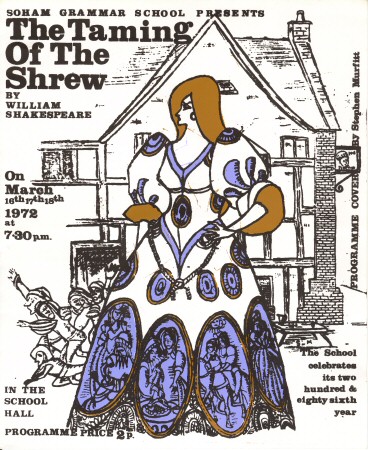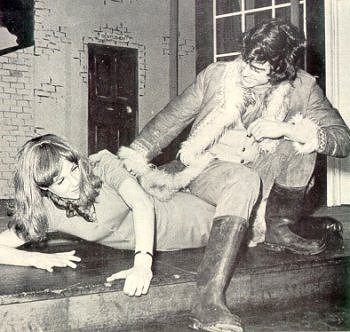The Taming of the ShrewThe PlotThe play is introduced by an 'Induction' in which Christopher Sly, a drunken tinker, is thrown out of a pub and falls asleep. A lord and his company find him and decide to play a practical joke by convincing him that he is a lord himself. They arrange for a travelling company of actors to perform a play for Sly's special benefit. This play, which follows, is The Taming of the Shrew. Baptista of Padua has two daughters. The younger, Bianca, is courted by Gremio and Hortensio; they are both outmanoeuvered by Lucentio, who disguises himself first as his own servant Tranio, and then as a schoolmaster in order to win her love. Tranio, disguised as his master, aids and abets his plan, Meanwhile Katharina, Baptista's notoriously shrewish elder daughter, is slighted by all until Petruchio arrives from Verona and determines to marry her. He woos her tempestuously, meets rudeness with rudeness, scrambles through a marriage ceremony, harries and humiliates her; but while he threatens and blusters he is also falling in love with her - and she with him. On their way back to Baptista's house they meet Lucentio's father, Vincentio. The confusion over Lucentio's identity is sorted out and a celebration party is held at which there are three newly married couples: Petruchio and Katharina, Lucentio and Bianca and Hortensio and a wealthy widow whom he has wed after losing Bianca. The bridegrooms bet as to which of them has the most obedient wife. Katharina eloquently expresses her new found opinions as to the true duty of a wife, and Petruchio wins the bet. |
 |
The Production
Soham Grammar School presents a contemporary Cambridgeshire interpretation of The Shrew. The scene is in the yard of a present day pub; the actors wear modern dress. In this last production of the Soham Grammar School Dramatic Society, past and present meet in one of the most carefree plays ever written.
SOHAM GRAMMAR SCHOOL, in conjunction with
ELY HIGH SCHOOL, presents
THE TAMING OF THE SHREW
by
William Shakespeare
Characters |
|
| Christopher Sly, a tinker | Nicholas Richardson |
| Hostess | Lesley Darlington |
| A Lord | Stephen Seymour |
| Huntsmen | Stephen Oakey, Robert Turner |
| Servants | Robert Hardwick, Kevin Lancashire, Richard Stonebridge |
| Bartholomew, a page | Kevin Parsons |
| Lucentio, a wealthy young man from Pisa | David Scott |
| Tranio, his servant | Richard Simpson |
| Biondello, his second servant | David Plumb |
| Baptista Minola, a rich gentleman of Padua | Peter Newell |
| Katharina, his elder daughter | Susan Beeby |
| Bianca, his younger daughter | Rosemary Russell |
| Hortensio, suitor of Bianca | Mark Curtis |
| Gremio, elderly suitor of Bianca | James Roberts |
| Petruchio, a gentleman of Verona | Martin Allen |
| Grumio, his servant | Martin Brunt |
| Curtis, his housekeeper | Davina Argent |
| A Pedant, who impersonates Vincentio | Martyn Davies |
| Vincentio, of Pisa, Lucentio's father | Robert Taylor |
| A Tailor | Robert Turner |
| A Haberdasher | Catherine Martin |
| A Rich Widow | Frances Hatch |
| Servants, messengers, etc. | Stephen Oakey, Kevin Lancashire, Robert Hardwick, Richard Stonebridge, Lesley Darlington |
There will be one interval of twenty minutes
| Set design and construction | Mr PJ Askem, Mr RGS
Bozeat V Gudgeon, A Nix, M Miller, B Anderson, S Brown, C Butler, PW Peachey, P Riches, R Taylor, S Neeves |
| Posters Programmes and tickets | SL Murfitt, V Gudgeon, A Chilvers |
| Lighting | E Scannell, SB Thornhill, A Steel |
| Sound Recordist | DP Phillips |
| Properties | Miss PL O'Keeffe, RG Street |
| Make-up | Miss AR Dunton, Mrs S Beeby, Mrs J Peers, Mrs B Zinober, Mr G Edwards, Mr DH Riley |
| Stage Manager | Mr RJ Humphry assisted by JW Carter, DP Fellows and Lesley Darlington |
| Business Manager | Mr RJ Abbott assisted by SJ Coxhead, PW Peachey and KK Stone |
| Producer | Mr R Russell |
Grateful thanks are extended to all those who have helped with furnishings and properties, especially to the "Cherry Tree", Soham, and the Arts Theatre, Cambridge.
The Headmaster and the producer wish to thank most sincerely the Headmistress and the English Department of Ely High School for their kind co-operation in making the production of this play possible.
source: Stephen Murfitt, Nov 2007: All the posters and programmes at that time were produced in the Art Department. They were designed and screen printed (one at a time), under the supervision of Peter Askem. This task was carried out by a small team of keen 6th form art students during lunch times and after school we were printing, cutting, folding and stapling. Quality control was very strict!
